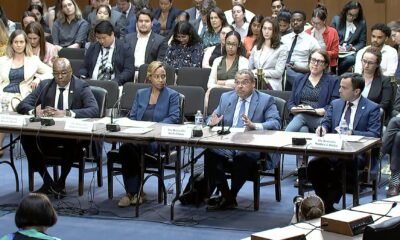arizona
GOP Unites Behind Trump Tariffs Amid Market Turmoil

The U.S. stock market faced significant turmoil on Monday, reflecting ongoing concerns among traders regarding the repercussions of a comprehensive tariff plan introduced by the Trump administration. This marked the most severe market decline since the onset of the COVID-19 pandemic.
Despite the alarming trends on Wall Street, Republican legislators have largely adhered to the White House’s narrative, asserting that these tariffs are instrumental in negotiating more favorable international trade agreements. The new policy, revealed last Wednesday, imposes a blanket 10% import tax on goods from many countries, with elevated duties specifically targeting China and the European Union.
This announcement triggered a sharp decline in financial markets globally. Prior to Monday’s trading, Japan’s Nikkei index plummeted nearly 8%, resulting in a temporary halt on futures trading as a precautionary measure. By midday Monday, the Dow Jones Industrial Average had suffered a drop of nearly 2%, closely followed by the S&P 500, which fell about 1.5%.
Nevertheless, the market’s volatility hasn’t deterred Republican lawmakers. Trump defended the tariffs in a post on X, urging his supporters to exhibit strength in pursuit of long-overdue reforms. “Don’t be Weak! Don’t be Stupid!” he stated.
GOP members rallied behind the president’s rhetoric. Colorado Representative Lauren Boebert emphasized trust in what she dubbed the “Trump Process,” while advocating against defeatism among her peers. “Don’t be a Panican!” she urged.
Arizona Representative Andy Biggs echoed her sentiments, praising the president’s leadership during these turbulent times. He expressed optimism on X, stating, “This is what real leadership in the White House looks like.”
Texas Representative Beth Van Duyne articulated her belief that the tariffs form a part of a broader, intricate strategy aimed at invigorating American businesses through tax reductions and deregulation. Meanwhile, Kansas Senator Roger Marshall reiterated the importance of addressing the nation’s trade deficit, framing tariffs as a pathway to revitalize American jobs.
Florida Representative Greg Steube condemned inequitable trade practices, asserting that countries like China have historically taken advantage of the U.S. He affirmed support for Trump’s initiatives to renegotiate terms for American workers.
House Speaker Mike Johnson advised the public to allow the president the necessary time to implement his new tariff policy, stating, “It’s been less than a week, so I think he’s earned that.”
However, not all Republicans share this enthusiasm. Kentucky Senator Rand Paul criticized the tariffs as a tax that could diminish trade. He maintained that Congress should have the sole authority to impose such duties, arguing, “Can the president raise taxes without the approval of Congress?”
In a bipartisan effort, Senators Paul and Tim Kaine introduced legislation to retract the recently announced tariffs on Canadian goods. Although it garnered limited Senate support, its future remains uncertain in the House. Additionally, Senators Chuck Grassley and Maria Cantwell proposed legislation aimed at curbing presidential tariff authority, requiring congressional notification within 48 hours of implementation.
The White House opposed this bill, asserting it would unduly restrict the executive branch’s long-established powers. In its statement, the administration warned that such limitations could jeopardize national security and foreign policy decisions.
The newly established tariffs not only implement a 10% import duty but also increase taxes on Chinese imports by an additional 34%, with total tariffs potentially reaching 54%. Notably, countries like Russia and North Korea are exempt from this new regime.

















